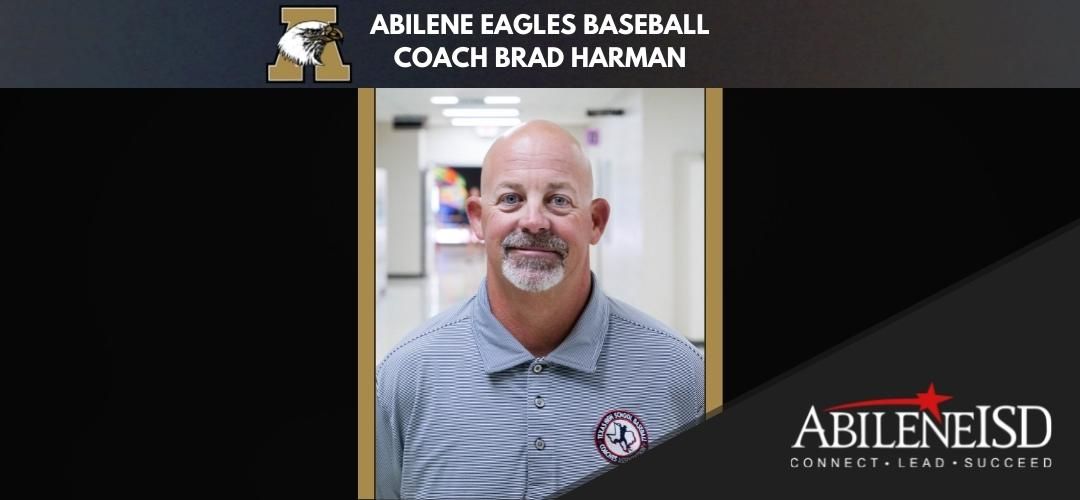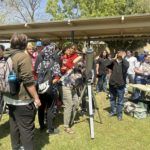Brad Harman recently began his 25th year in education, but his first in the Abilene ISD. Harman and his family moved to Abilene this summer after he was hired as the new head baseball coach at Abilene High School.
When he first got into teaching and coaching, Harman said he believed the job was about winning games on the football field or the baseball diamond. But he’s learned over the last 10-12 years that the profession he’s undertaken is all about one thing that has nothing to do with winning games.
“The simple answer as to what this job is about is relationships,” said Harman, who was hired in mid-June after spending the previous three years at Big Spring High School. “It’s about relationships on the field, in the classroom, with your colleagues, or with kids in the classroom. The second half of my career has come full circle for me on what this whole thing is about and it’s the relationships and memories you make. When you reach that kid that a lot of people might have said wasn’t worth the effort or that he or she was too far gone, and you realize they aren’t, and you help them get over the hump. And then they go on to college and they have families and careers of their own. That’s what we’re doing is all about.”
Harman relayed those thoughts while at New Teacher Orientation in August, one of numerous pre-school year orientation sessions he’s attended during his career in education. Before teaching and coaching at Big Spring, he spent six years at Monahans High School, one year before that at Lago Vista High School, four years before that at Llano High School, five years before that at Coahoma High School, and he started his career by spending five years as an assistant coach at Skidmore-Tynan High School in south Texas.
In other words, he’s seen just about every situation that can be presented to a teacher or coach, including when it comes to orientation sessions.
“(Orientation sessions) are no different than what we do as coaches; they’re just mapping out expectations,” said Harman, who, in addition to his duties as the baseball coach is also the outside linebackers coach for football and U.S. History teacher. “Teachers are no different from kids in that if you don’t know what’s expected of you, it’s hard to meet expectations.”
Harman, who is married with three children all under the age of 12, got into education and coaching because of the mentors, teachers, and coaches who influenced him while he was growing up in Marble Falls. However, what he didn’t understand was how his view of the job would change over the years.
“When I first got into the job, I thought it was all about winning,” he said. “In my first three years at Skidmore-Tynan, we had a lot of success and went at least four rounds deep in the baseball playoffs each year. I got caught up in that, and that’s what I thought it was all about. When I got my first head coaching job at Coahoma, I believed everything was about wins and losses.
“It wasn’t until about my seventh year as a head coach where we didn’t have a successful season,” he said. “I was down and not feeling good about myself because we didn’t have a good year. But it was shortly after that season ended that I realized that the first few classes of kids I had taught or coached were graduating from college. I was getting invitations to weddings or graduations or phone calls and texts telling me that I helped them at a certain point in their life when they needed it. That’s when the light came on for me that it’s not about winning. I didn’t truly understand the impact I was making in creating those relationships. When I realized that was what was happening is when my goals changed, and it became more about impacting and influencing young lives.”
And if there’s a way he could influence younger or even first-year teachers right out of college, it would be to advise them to not be afraid to be inquisitive in their new jobs.
“I wish someone would have told me this early in my career, but I would tell all of those young teachers out there to not be afraid to ask questions,” Harman said. “The stresses they’ll have – just like I did – they’ll probably feel like they’re the only ones going through those, and they’ll probably feel like they’re doing a lot of things wrong. I know I didn’t ask questions because I didn’t want to come across as if I didn’t know what I was doing or that I wasn’t ready.
“But my advice would be to ask questions,” he said. “That’s what we tell our kids in class all the time. A lot of times, those young teachers are afraid to approach veteran teachers and ask questions, but I love it. I love to answer questions and try to help. And while I might not know the answer to the question, I’ll bet I can help them find it.”












